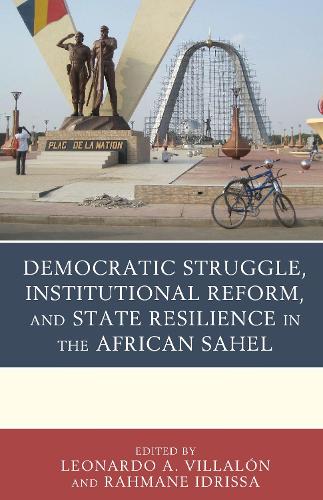
Democratic Struggle, Institutional Reform, and State Resilience in the African Sahel
(Paperback)
Available Formats
Publishing Details
Democratic Struggle, Institutional Reform, and State Resilience in the African Sahel
By (Author) Leonardo A. Villaln
Edited by Rahmane Idrissa
Contributions by Leonardo A. Villaln
Contributions by Zekeria Ould Ahmed Salem
Contributions by Ismala Madior Fall
Contributions by Moumouni Soumano
Contributions by Augustin Loada
Contributions by Mahaman Tidjani Alou
Contributions by Lucien Toulou
Contributions by Rahmane Idrissa
Bloomsbury Publishing PLC
Lexington Books
2nd July 2021
United States
Classifications
Professional and Scholarly
Non Fiction
African history
320.9660917541
Physical Properties
Paperback
230
Width 154mm, Height 230mm, Spine 18mm
345g
Description
Long on the periphery of both academic research and international attention, the countries of the West African Sahel currently find themselves at the center of global concerns over security, terrorism, migration, and conflict. Since the early 1990s the Sahelian states have also been engaged in political struggles over the construction of democratic institutions. Edited by Leonardo A. Villaln and Abdourahmane Idrissa, Democratic Struggle, Institutional Reform, and State Resilience in the African Sahel addresses a key and little-studied question: How have the politics of democratization across the Francophone Sahel shaped processes of state-building, and with what effects on the resilience of state institutions Starting from the premise that variation in the politics of institution building and institutional reformalthough most frequently justified and debated in terms of democratizationhave differing impact on the construction of resilient states , this book examines these processes in six francophone states of the Sahel: Senegal, Mauritania, Mali, Burkina Faso, Niger, and Chad. The contributors represent a set of distinguished scholars from across the region, many of whom have also been important actors in the struggles they analyze.
Reviews
This excellent collection of studies of six Francophone countries in the Sahel region of West Africa (Burkina Faso, Chad, Mali, Mauritania, Niger, and Senegal) examines the impact of democratization on state building since the early 1990s. The supporters of democratization assumed that it would produce more legitimate and effective central states. The process has proved partial and uneven, but all six countries did allow political oppositions to form and began to convene regular multiparty elections. The valuable case studies of Burkina Faso, Mauritania, and Niger suggest that the turn to electoral politics strengthened institutions, whereas the chapter on Mali shows how democratization led to the governments collapse in 2011. The collection offers no easy generalizations to explain this variation but draws out the social, political, and economic histories of each country, the choices made by individual politicians, and the key political groups that shaped institutional outcomes.
* Foreign Affairs *This is an important book because it collects together valuable lessons from a number of understudied countries and connects them to key debates within the literature on democratization and African studies. The fact that the introduction integrates the insights from the different chapters into a helpful conceptual framework means that it stands above most edited collections and should be considered essential reading. -- Nic Cheeseman, University of Birmingham and author of Democracy in Africa
This important volume traces the politics of democracy and constitutional reform in some of Africa's most complex, fragile, and strategically-significant states. In West African Sahelian countries, Islam and politics merge in a myriad of ways to shape state resilience and decline. On the impact of democratization reforms, the authors provide sobering analyses of the power of unintended consequences and ill-considered external interventions. A unique and powerful achievement that goes very far in helping scholars and policy-makers understand this critical region. -- Catherine Boone, London School of Economics
This book sheds some essential light on the critical and precarious relationship between democratization and state institutions in Sahelian countries. Democratization was about making rulers accountable to their citizens as well as including segments of Sahelian societies whose voices had been previously excluded from the political process. For their part state institutions were supposed to provide social services, deliver and guarantee the protection of the law to all, and supply security. Looking at six countries of the Sahel, this book demonstrates how complicated this relationship has been and continues to be. It historicizes this relationship, delves into the messiness of history and connects the micro-transitions to current larger political developments. -- Cdric Jourde, University of Ottawa
Author Bio
Leonardo A. Villaln is professor of African politics at the University of Florida.
Rahmane Idrissa is senior researcher in the African Studies Centre at the University of Leiden.
